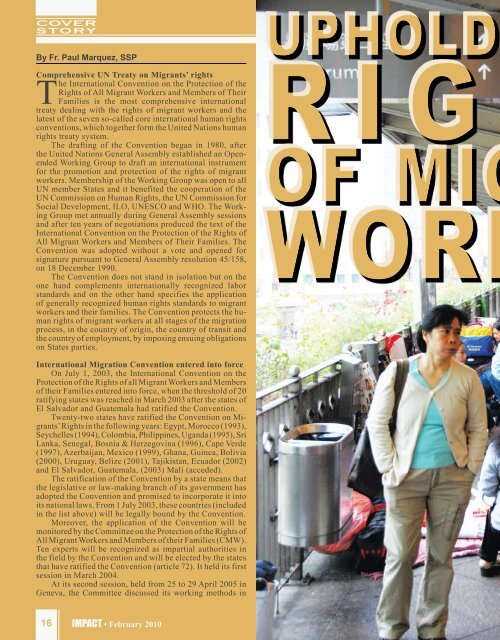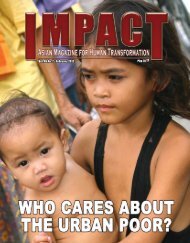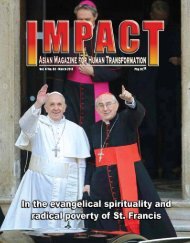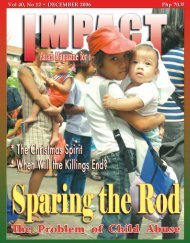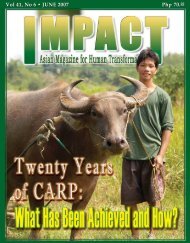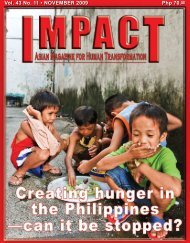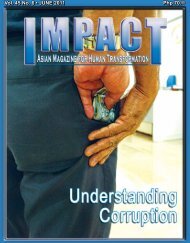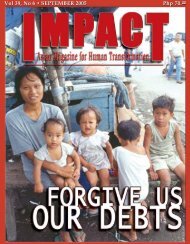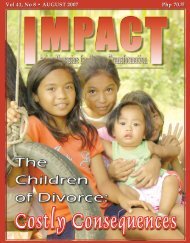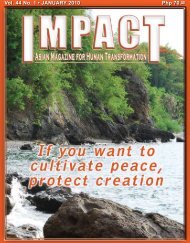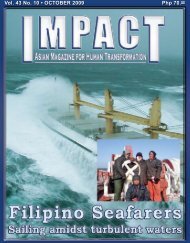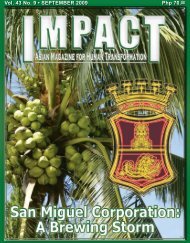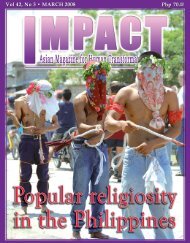Download - IMPACT Magazine Online!
Download - IMPACT Magazine Online!
Download - IMPACT Magazine Online!
You also want an ePaper? Increase the reach of your titles
YUMPU automatically turns print PDFs into web optimized ePapers that Google loves.
COVER<br />
STORY<br />
By Fr. Paul Marquez, SSP<br />
Comprehensive UN Treaty on Migrants’ rights<br />
The International Convention on the Protection of the<br />
Rights of All Migrant Workers and Members of Their<br />
Families is the most comprehensive international<br />
treaty dealing with the rights of migrant workers and the<br />
latest of the seven so-called core international human rights<br />
conventions, which together form the United Nations human<br />
rights treaty system.<br />
The drafting of the Convention began in 1980, after<br />
the United Nations General Assembly established an Openended<br />
Working Group to draft an international instrument<br />
for the promotion and protection of the rights of migrant<br />
workers. Membership of the Working Group was open to all<br />
UN member States and it benefited the cooperation of the<br />
UN Commission on Human Rights, the UN Commission for<br />
Social Development, ILO, UNESCO and WHO. The Working<br />
Group met annually during General Assembly sessions<br />
and after ten years of negotiations produced the text of the<br />
International Convention on the Protection of the Rights of<br />
All Migrant Workers and Members of Their Families. The<br />
Convention was adopted without a vote and opened for<br />
signature pursuant to General Assembly resolution 45/158,<br />
on 18 December 1990.<br />
The Convention does not stand in isolation but on the<br />
one hand complements internationally recognized labor<br />
standards and on the other hand specifies the application<br />
of generally recognized human rights standards to migrant<br />
workers and their families. The Convention protects the human<br />
rights of migrant workers at all stages of the migration<br />
process, in the country of origin, the country of transit and<br />
the country of employment, by imposing ensuing obligations<br />
on States parties.<br />
UPHOLDI<br />
RIGH<br />
OF MIG<br />
WORK<br />
International Migration Convention entered into force<br />
On July 1, 2003, the International Convention on the<br />
Protection of the Rights of all Migrant Workers and Members<br />
of their Families entered into force, when the threshold of 20<br />
ratifying states was reached in March 2003 after the states of<br />
El Salvador and Guatemala had ratified the Convention.<br />
Twenty-two states have ratified the Convention on Migrants’<br />
Rights in the following years: Egypt, Morocco (1993),<br />
Seychelles (1994), Colombia, Philippines, Uganda (1995), Sri<br />
Lanka, Senegal, Bosnia & Herzegovina (1996), Cape Verde<br />
(1997), Azerbaijan, Mexico (1999), Ghana, Guinea, Bolivia<br />
(2000), Uruguay, Belize (2001), Tajikistan, Ecuador (2002)<br />
and El Salvador, Guatemala, (2003) Mali (acceded).<br />
The ratification of the Convention by a state means that<br />
the legislative or law-making branch of its government has<br />
adopted the Convention and promised to incorporate it into<br />
its national laws. From 1 July 2003, these countries (included<br />
in the list above) will be legally bound by the Convention.<br />
Moreover, the application of the Convention will be<br />
monitored by the Committee on the Protection of the Rights of<br />
All Migrant Workers and Members of their Families (CMW).<br />
Ten experts will be recognized as impartial authorities in<br />
the field by the Convention and will be elected by the states<br />
that have ratified the Convention (article 72). It held its first<br />
session in March 2004.<br />
At its second session, held from 25 to 29 April 2005 in<br />
Geneva, the Committee discussed its working methods in<br />
16<br />
<strong>IMPACT</strong> • February 2010


